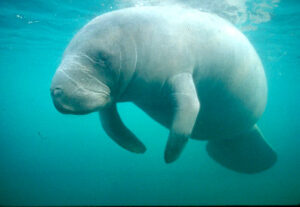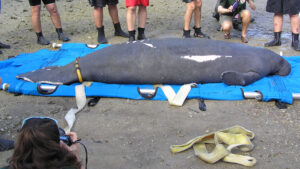This article originally appeared on Inside Climate News, a nonprofit, non-partisan news organization that covers climate, energy and the environment. Sign up for their newsletter here.
By Amy Green, Inside Climate News
ORLANDO, Fla. — Protections for Florida’s ailing manatees would remain unchanged under a U.S. Fish and Wildlife Service proposal announced this week.
The manatees would retain their listing as threatened under the Endangered Species Act, despite ample criticism that has ensued since 2017, when the federal agency downlisted the beloved sea cows from endangered. In its proposal, the agency said the Florida population has stabilized at between 8,350 and 11,730 animals and that the decision is based on the best available science.
Nearly 2,000 manatees died in Florida in 2021 and 2022, a two-year record. The calamity prompted the Fish and Wildlife Service and Florida Fish and Wildlife Conservation Commission to resort to providing supplemental lettuce for starving manatees in the Indian River Lagoon, a crucial manatee habitat on the state’s east coast where ongoing water quality problems have led to widespread losses of seagrass, the manatee’s favorite food. Conservation groups said the deaths represented more than 20 percent of the state’s population.
“They should never have been downlisted, and so this was the time to fix that error,” said Pat Rose, executive director of the Save the Manatee Club, one of the groups involved in a petition that prompted the Fish and Wildlife Service to review the manatee’s status.

“You add the pollution levels, the harmful algae blooms, the loss of seagrass and the climate change issues together. I don’t see how they could hold to what their decision was back in 2017, that according to the Endangered Species Act they’re supposed to have determined with the best scientific information that the risks and threats to manatees are under control,” he said. “That’s just not accurate.”
The Fish and Wildlife Service proposal calls for establishing separate listings under the Endangered Species Act for two subspecies of the West Indian manatee, which now is classified as threatened. The Florida manatee would continue to be recognized as threatened, while the Antillean manatee would be uplisted to endangered.
Florida manatees are found along the coasts of the Atlantic Ocean and Gulf of Mexico and in the Caribbean from the Bahamas to Turks and Caicos. Antillean manatees range from Cuba, Hispaniola, Jamaica, Puerto Rico and the Virgin Islands to Mexico, Panama, Trinidad and Tobago and Brazil. The subspecies are similar, although the federal agency said their separate ranges and unique risks warranted distinct conservation efforts.
Florida manatees are increasingly vulnerable to watercraft collisions. Conservationists also worry about the reduction of artificially warm waters around power plants where the cold-sensitive animals gather during the winter, as power companies transition away from fossil fuels because of climate change.
“The elimination of all those warm water sources, if [the Fish and Wildlife Service doesn’t] put the level of commitment and responsibility to that, we’re going to see literally thousands of manatees likely die,” Rose said. “That is probably the most essential issue going forward, as to why I’m concerned, because I think with an endangered status it would receive better attention and a more thorough effort.”
Risks for Antillean manatees include poaching and limited genetic diversity. But the Fish and Wildlife Service said that while Antillean manatees have lost population across most of their range, conditions in Florida have improved since 2021 and 2022.
The federal agency said seagrasses in the Indian River Lagoon are rebounding, and that gains in the Florida manatee’s population and habitat meant it did not fit the definition of endangered. Under the Endangered Species Act, an endangered animal is at risk of extinction throughout all or most of its range, while a threatened animal is likely to become endangered in the near future. Protections are the same regardless of classification, and the Florida manatee recovery program will continue undiminished, said Billy Brooks, a biologist at the agency.

“Certain areas may have impacts that are significant to the manatees of that part of the state. But because there is this connectivity and demographic agility to recover, it has led us to believe manatees aren’t currently going extinct,” he said. “But … because of threats like continued increase in watercraft mortality, impacts to seagrasses and the potential loss of warm water sites in the future, this leads us to believe that it could become in danger of going extinct in the foreseeable future.”
The petition to restore the West Indian manatee’s endangered status was filed by the Save the Manatee Club, Center for Biological Diversity, Harvard Animal Law & Policy Clinic, Miami Waterkeeper and Frank S. González García, a concerned citizen. A separate petition requested that manatees in Puerto Rico be protected as a distinct endangered population. Ragan Whitlock, Florida staff attorney at the Center for Biological Diversity, characterized the new proposal as disappointing for Florida manatees and said the animals remain vulnerable to another die-off.
“There is no guarantee that this won’t happen again in the future,” he said. “We know that seagrasses are declining across the state of Florida.”
Meanwhile, the Fish and Wildlife Service proposed last September expanding the manatee’s critical habitat in Florida to nearly 2 million acres and establishing new critical habitat in Puerto Rico spanning 78,000 acres. Critical habitat is a legal term encompassing waterways considered vital to the manatee’s recovery. The federal agency extended the comment period for this proposal to Jan. 24, 2025, because of hurricanes Helene and Milton.
The unprecedented number of manatee deaths in Florida in 2021 and 2022 triggered multiple lawsuits. A federal judge decided in December to allow one of those lawsuits, against the Florida Department of Environmental Protection over sewage flows into the northern Indian River Lagoon, to go to trial. Bear Warriors United, a wildlife advocacy group, had accused the state of violating the Endangered Species Act by failing to regulate the effluent, a primary factor in the pollution responsible for the water quality problems and seagrass losses.
The Fish and Wildlife Service is accepting comments on the proposed changes under the Endangered Species Act until March 17. A virtual public hearing is scheduled for Feb. 26.
Amy Green covers the environment and climate change from Orlando. She is a mid-career journalist and author whose extensive reporting on the Everglades is featured in the book “Moving Water,” published by Johns Hopkins University Press, and podcast “Drained,” available wherever you get your podcasts. Amy’s work has been recognized with many awards, including a prestigious Edward R. Murrow Award and Public Media Journalists Association award. Banner photo:
A mother manatee and calf swimming. (Sam Farkas/NOAA Photo Library).
Sign up for The Invading Sea newsletter by visiting here. To support The Invading Sea, click here to make a donation. If you are interested in submitting an opinion piece to The Invading Sea, email Editor Nathan Crabbe at nc*****@*au.edu.



